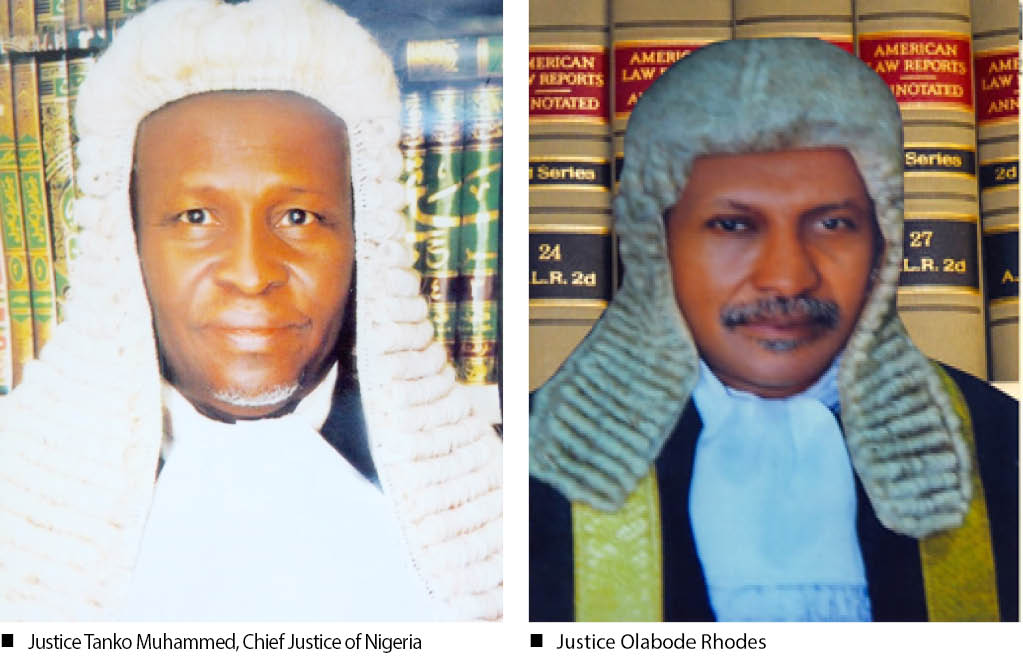NJC’s COVID-19 guidelines raise issues
The guidelines approved by the National Judicial Council (NJC) for the conduct of court proceedings in the period of the COVID-19 pandemic has attracted some legal issues. The main issues, according to some lawyers, is that judicial outcomes from some of their irregular provisions may not stand the test of the law as they may […]

The guidelines approved by the National Judicial Council (NJC) for the conduct of court proceedings in the period of the COVID-19 pandemic has attracted some legal issues.
The main issues, according to some lawyers, is that judicial outcomes from some of their irregular provisions may not stand the test of the law as they may create gaps which parties could exploit when matters go against them.
The statement on the guidelines titled: “Re: National Judicial Council COVID-19 Policy Report: Guidelines for Court Sittings and Related Matters in the COVID-19 Period”, was signed by the Chief Justice of Nigeria (CJN), Justice Tanko Muhammad, on Thursday, May 7, 2020.
- FCT High Court resumes regular proceedings May 11
- Supreme Court’s judgment on Kalu ‘unfortunate’, re-trial underway, says EFCC
The NJC said the guidelines followed its 91st meeting of April 22, 2020, where it set up a committee headed by a Supreme Court Justice, Bode Rhodes-Vivour, to devise guidelines and measures to enable safe court sittings during the period of the pandemic in cooperation with the Office of the Attorney General of the Federation (OAGF).
Some provisions of the guidelines
The NJC directed the courts to provide fast-speed, pervasive and reliable internet connectivity, while the end-user would provide hardware devices such as desktops, laptops, tablets and smart phones. This will serve for the virtual sittings using collaborative platforms such as MS365, Zoom, Google meetings and other tools with electronic recording functionalities.
Other measures include checks at court premises, filing of court processes, payment of filing fees, service of hearing notices, virtual or remote sittings, physical court sittings and general provisions.
Analysts do not see a problem in the provisions on the physical checking at the entrance of the courts which requires gloves, face masks, hand sanitisers, temperature checks and disinfection of premises. There is also sanitisation and quarantine of court processes for 96 hours, not more than 20 persons in the courtroom apart from court officials and two metres apart sitting arrangement.
However, analysts see the provisions on virtual and remote sittings to be more problematic. The guidelines provide that physical court sittings must be limited only to time-bound, extremely urgent and essential matters that may not be heard by a court remotely or virtually.
The guidelines state in part that, “Virtual court sittings (alternately referred to as ‘remote court sittings’ or ‘online court sittings’) should be encouraged and promoted by the courts and counsel. The courts should insist on such remote hearings for matters that do not require taking any evidence. All judgments, rulings and directions may be delivered and handed down by the courts in and through remote court sittings.
“Save for extremely urgent and time-bound matters, contentious matters that require the calling of evidence in a physical courtroom setting should not be called up by the courts at this time.
The guidelines further state that, “As the courts and counsel become proficient in virtual court sitting arrangements, the courts may, on a trial-run basis, gradually experiment with taking witnesses and evidence virtually. This is important given the fact that no one can estimate with any degree of certainty how long the COVID-19 pall will hang over humanity or when exactly a therapeutic cure or vaccine may be found for the disease.”
For decisions on the location for virtual court sittings, the NJC said judges, court officials and security personnel shall, as a default arrangement, sit and be in the regular courtrooms for remote court sittings except otherwise with the leave of court.
The NJC explained that, “Save with the consent of the court or the prior written agreement of the parties, it is not permissible for any of the parties to a matter that is being heard virtually to be in the courtroom with the judicial officer(s) during the virtual court sitting while the other party or parties to the same matter join the proceedings remotely.”
It further directed judges to conduct virtual court sittings from their respective chambers, and for the purposes of delivering judgments or rulings, they may liaise with court officials and conduct the virtual court sittings from whichever location the judicial officer may be.
It explained that this provision concerned judicial officers “who may need to deliver time-bound judgments and/or rulings but are marooned in locations away from their usual stations consequent upon the present national lockdown and travel restrictions pursuant to COVID-19.”
The guidelines also note that to satisfy the requirements for public hearing of matters, there should be provision for live streaming of all virtual court proceedings through a publicised URL or any of the court’s social media channels, and added that sittings and mode of sittings shall be published regularly.
Guidelines won’t stand test of law – Lawyers
Speaking on the guidelines for judicial proceedings during the COVID-19 pandemic, Adeniyi Akintola (SAN), said the guidelines may be creating loopholes which some parties will exploit unless they are backed by proper constitutional amendments since the High Court is a court of record.
Akintola said, “Guidelines still remain guidelines and cannot override the constitution.”
A former Deputy Director General of the Nigerian Law School, Prof. Ernest Ojukwu (SAN), had earlier called for inclusion of ICT in court proceedings.
Prof. Ojukwu said this could be achieved by making rules or issuing practice directions to fill such gaps in virtual hearings, especially in non-contested motions, and that subsequently more sustainable reforms might be made in the judiciary.
